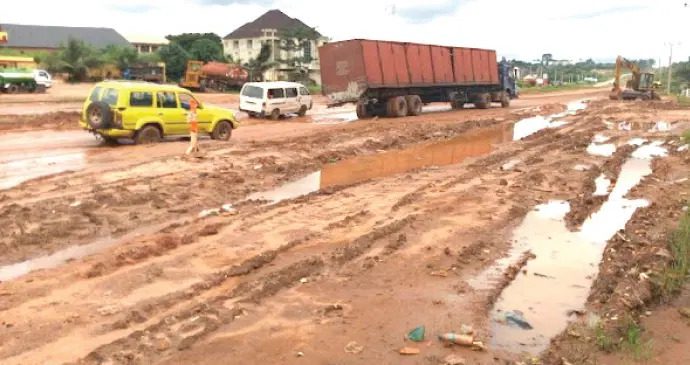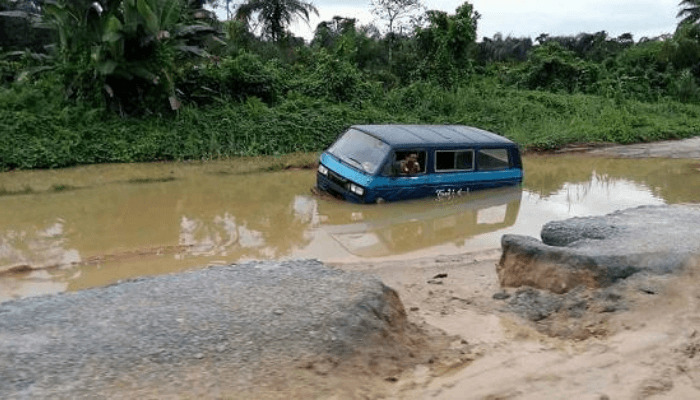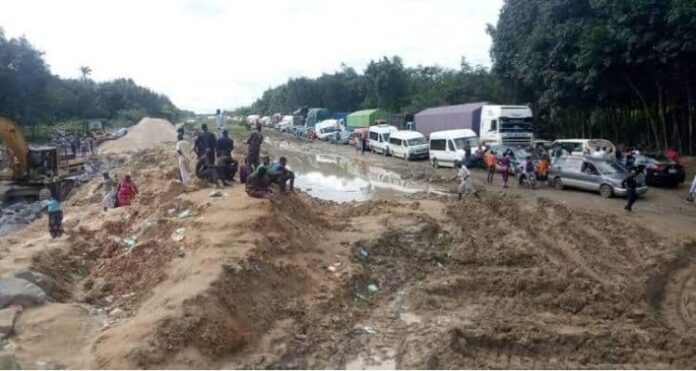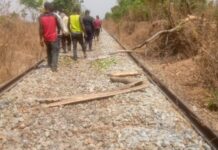A section of Warri- Benin road.
Monday Iyke
The deplorable condition of both federal and state roads in southern Nigeria is a pressing issue that warrants immediate attention. Despite the region’s significant contribution to the national economy, particularly through oil revenue and other resources, the state of infrastructure, especially roads, has remained woefully inadequate.
This neglect is even more disheartening given the regular allocations received by state governments from the Federation Account Allocation Committee (FAAC). Despite these funds, tangible progress toward addressing the region’s infrastructural decay has been minimal.
Travelers embarking on a journey from Edo State to Cross River State, passing through Delta, Bayelsa, Rivers, and Akwa Ibom States, are met with a harrowing experience of roads filled with potholes, eroded surfaces, and poorly maintained routes. Similarly, an alternate route through Delta, Anambra, Enugu, and Ebonyi States offers no respite. For instance, the East-West road, a key federal highway connecting major oil-producing states in the Niger Delta, remains in a dilapidated state despite repeated promises by successive administrations to rehabilitate and complete it. The neglect of this critical route has made travel perilous, delayed the movement of goods, and exposed commuters to unnecessary risks.
 A section of East – West road.
A section of East – West road.
Efforts by successive governments to remedy the situation have been largely ineffective. Promises of road repairs, reconstruction, and development have often been made during election campaigns but seldom fulfilled. Projects are frequently abandoned midway, leaving contractors unpaid and road users stranded. The Akwa Ibom-Itu-Calabar highway, for example, has been under construction for decades with little progress to show, despite its importance to inter-state commerce and connectivity.
READ: After three years of rigmarole, FG announces new funding plan for Calabar-Itu road
The impact of these bad roads is far-reaching. They have become death traps, with frequent accidents claiming the lives of travelers and commuters. Commercial drivers navigating these hazardous routes often recount heart-wrenching stories of accidents caused by vehicles attempting to dodge deep potholes or manoeuver around failed sections of the road. Beyond accidents, the poor road conditions have created an environment conducive to insecurity. Armed robberies and kidnappings are rampant on these poorly lit and isolated routes, further endangering the lives of commuters.
Economically, the consequences are dire. Southern Nigeria is a hub of economic activities, with industries, agriculture, and trade thriving in the region. However, the deplorable roads have made the transportation of goods and services both costly and inefficient. Farmers, for instance, face significant challenges in transporting their produce to urban markets, leading to increased post-harvest losses and reduced profits. In Rivers State, oil companies have expressed concerns over the difficulty of moving equipment and personnel due to the poor road network. These challenges not only stifle local economic growth but also hinder the region’s overall contribution to the nation’s economy.
 Deplorable state of Calabar-Itu road.
Deplorable state of Calabar-Itu road.
The question remains: why has such a vital region, which generates immense revenue for the country, been subjected to this level of neglect? While some blame corruption and poor project execution, others point to a lack of political will and accountability. Projects are often initiated with fanfare but are abandoned once funds are mismanaged or diverted.
Recommendations:
Increased budgetary allocation and timely disbursement: Federal and state governments must allocate sufficient resources for road rehabilitation and ensure funds are disbursed promptly to avoid project delays.
Transparent monitoring and evaluation systems: Establish independent monitoring bodies to oversee road projects and ensure that funds are utilized effectively. Regular audits should be conducted to track project progress and prevent corruption.
Public-Private Partnerships (PPPs): Collaborate with private sector investors to mobilize resources and technical expertise. PPP models can ensure faster project execution and maintenance.
Adoption of Modern Construction Standards: Employ durable and sustainable construction materials to build roads that can withstand heavy traffic and harsh weather conditions.
Community Involvement: Engage local communities in monitoring projects to ensure accountability. Grassroots participation can help highlight issues and deter project abandonment.
Emergency Repairs: Identify critical sections of roads that require immediate attention and prioritize their repair to minimize accidents and disruptions.
Long-Term Planning: Develop a comprehensive master plan for road infrastructure in southern Nigeria that includes regular maintenance schedules and provisions for expansion to meet growing demands.
In conclusion, the condition of roads in southern Nigeria is a reflection of broader infrastructural and governance challenges. The federal and state governments must rise to the occasion and tackle this menace head-on. Safe and functional roads are not a luxury; they are a necessity for economic growth, security, and the overall well-being of the people. It is high time that the region’s contributions to the nation’s wealth are matched with investments in its infrastructure. Implementing these recommendations will not only address current challenges but also lay the foundation for a more prosperous and connected region.
















